
German postcard by Verlag Hermann Leiser vorm. Louis Blumenthal, Berlin, no. 1275. Photo: Becker & Maass, Berlin. Caption: Paul Wegener as Mephisto (in Goethe's 'Faust').
German actor, writer and film director Paul Wegener (1874-1948) is one of the true fathers of the Horror and Fantasy genre. He is particularly remembered for his three silent films centred around the Jewish legend of the Golem. Wegener was one of the pioneers of German cinema who realised the potential of the new medium and used the possibilities of cinematic trick photography as a method for presenting fantastic tales in a serious matter.

German postcard by Verlag Louis Blumenthal, Berlin, no. 2455. Photo: Becker & Maass.
German actress Ida Wüst (1884-1956) was a popular Ufa star in the 1920s and 1930s. She appeared in almost 150 films. After a stage career e.g. at the Berlin Lessing Theater, she became an active film actress from the late 1910s onward. Between 1913 and 1924 she was married to actor Bruno Kastner.
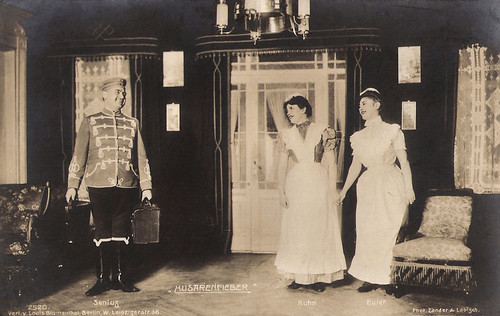
German postcard by Verlag, v. Louis Blumenthal, Berlin, no. 2520. Photo: Zander & Labisch Richard Senius in 'Husarenfieber', also with the actresses Kuhn and Euler.
German singer, actor and writer Richard Senius (1875-1947) often appeared in films directed by William Karfiol. He became much in demand in the silent cinema of the 1910s. He was known for such films as Donna Lucia (1918), Primanerliebe (1918) and Frauchen in Nöten (1918). His film career came to an end at the beginning of the 1920s. In 1933, he made a short comeback in the sound film Ganovenehre (1933). The play 'Husarenfieber' was written by Gustav Kadelburg and Richard Skowronnek in 1906. Kadelburg is well known for his plays 'Im weißen Rößl' (The White Horse In, 1896) and 'Familie Schimek' (The Schimeck Family, 1915) which both were filmed several times. 'Husarenfieber' was also adapted to the screen, Husarenfieber/Hussar Fever (Georg Jacoby, 1925).
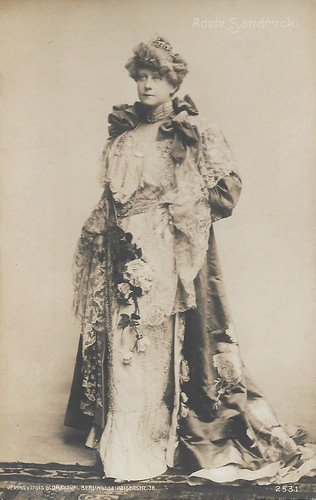
German postcard by Verlag Louis Blumenthal, Berlin, no. 2531.
Grand German-Dutch actress Adele Sandrock (1863-1937) had a successful theatrical career all over Europe. In Vienna, she had a stormy affair with the famous playwright Arthur Schnitzler and enjoyed triumphs as the diva of the modern playwrights. In the 1910s she became one of the first German film stars. After the introduction of sound, she emerged as a witty comedienne. She excelled as the intimidating elderly dragon, who could be surprisingly funny and tactful.

German postcard by Verlag Louis Blumenthal, Berlin, no. 2680.
Albanian-Austrian Alexander Moissi (1879-1935) was one of the great European stage actors of the early 20th century. The attractive and charismatic women's idol also appeared in several silent and early sound films.
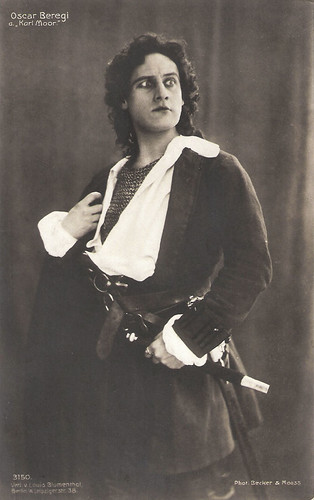
German postcard by Verlag Louis Blumenthal, Berlin, no. 3150. Photo: Becker & Maass. Oscar Beregi as Karl Moor in the play 'Die Räuber' (The Robbers) by Friedrich Schiller.
Hungarian stage and film actor Oscar Beregi, Sr. (1876-1965) appeared in 27 European and American films between 1916 and 1953. He is remembered as Dr. Baum in Fritz Lang’s Das Testament des Dr. Mabuse (1933).
The puzzle is not complete yet
The Berlin publishing company Verlag Hermann Leiser originated from the Verlag Louis Blumenthal and was active from about 1909 until the end of the 1920s. Verlag Louis Blumenthal existed before, and probably published postcards since ca. 1902. Louis Blumenthal first operated solo, followed by a multi-year partnership between Blumenthal and Hermann Leiser, and finally ending in a solo operation by Leiser.
Jean Ritsema at Ross Postcards researched where Blumenthal worked: "Louis Blumenthal is first seen in the online Berlin address books in 1878, doing business as a merchant at Mohrenstraße 17/18, Berlin, owner F. Simon. By 1880, the entry has expanded to include book printing, the paper trade, leather goods, writing materials and office supplies, still at the same address. Blumenthal is listed as the owner." In 1884, the business was relocated to Leipzigerstraße 38, the address that is printed on early Blumental postcards. The firm remained at this address.
Around 1898, Blumenthal was joined by Hermann Leiser. The partnership lasted for a decade. Ritsema writes that the 1909 address book entry notes sole ownership of Leipzigerstraße 38 by Blumenthal, with Hermann Leiser listed as a merchant at that address. The 1910 entry lists Hermann Leiser on his own as a merchant at Olivaer Platz 4. Correspondingly, cards from this year were marked 'Verlag Hermann Leiser vormals Louis Blumenthal'. Between 1911 and 1913 the reference to Blumenthal was dropped.
Blumenthal published postcards of artists, opera singers, actors, and musicians. The cards were in the beginning unnumbered and later numbered with four digits. Early Blumenthal cards bear no sign of a publisher or are only marked on the back of the card. Jean Ritsema notes that "estimating a date for when Blumenthal's involvement with postcards began is difficult. A start date of 1878, when he first appears in the address books, is unlikely. However, by 1903 when an advertisement appeared in the Monatsschrift für das deutsche Geistesleben, his card inventory already numbered over 1000." Louis Blumenthal probably was the father of critic and playwright Oskar Blumenthal (1852-1917). In 1875 Blumenthal became a theatrical critic of the Berliner Tageblatt, holding this position until 1887, when he opened the Lessing Theater, of which he was director till 1898. From 1894 to 1895 he was also director of the Berliner Theater.
For Ross Postcards, Jean Ritsema made a catalogue of the Verlag Louis Blumenthal postcards. This was not a straightforward process. It was complicated by Blumenthal's reuse of the inventory control numbers on the cards, as evidenced by the number of the Paul Wegener postcard in this post. The puzzle is not complete yet. So if you have postcards by Verlag Louis Blumenthal or Verlag Hermann Leiser which are not in the catalogue yet, please send Jean a scan.
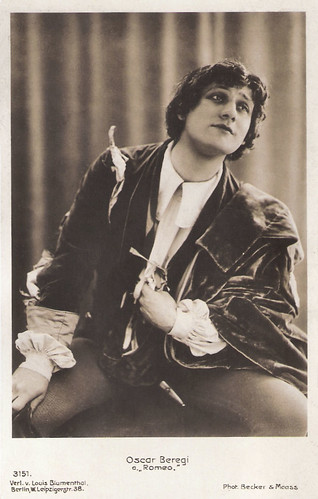
German postcard by Verlag Louis Blumenthal, Berlin, no. 3151. Photo: Becker & Maass. Oscar Beregi as Romeo in 'Romeo and Juliet' by William Shakespeare.
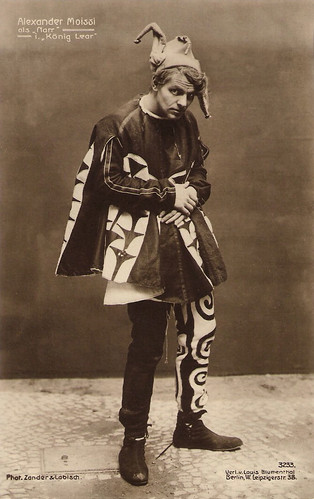
German postcard by Verlag Louis Blumenthal, Berlin, no. 3233. Photo: Zander & Labisch. Alexander Moissi as the fool in 'König Lear' (King Lear) by William Shakespeare.
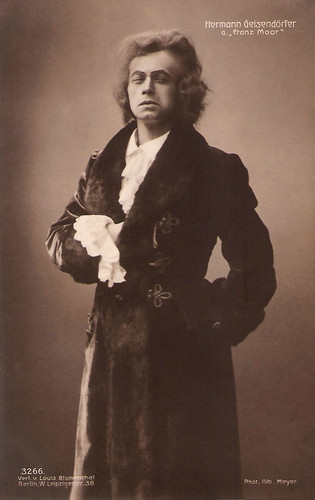
German postcard by Verlag Louis Blumenthal, Berlin-W., no. 3266. Photo: Albert Meyer. Julius Geisendörfer in 'Franz Moor'. The name printed on the card is a mistake.
Julius Geisendörfer (1878-1953) was a popular German stage actor and director. He played Franz Moor in the stage play 'Die Räuber' by Friedrich v. Schiller. He also appeared in a few silent films, including Die Tänzerin Adina (Max Mack, 1918), Föhn (Hans Werckmeister, 1920) and Menschen im Rausch (Julius Geisendörfer, 1921), starring Conrad Veidt.
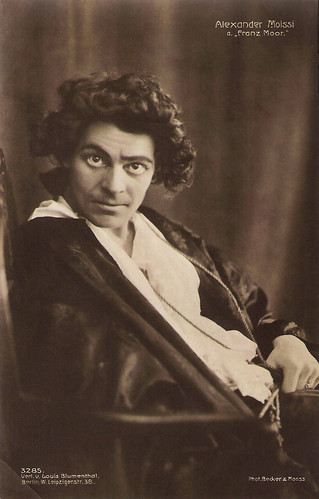
German postcard by Verl. v. Louis Blumenthal, Berlin, no. 3285. Photo: Becker & Maass. Alexander Moissi as Franz Moor in the stage play 'Die Räuber' (The Robbers) by Friedrich Schiller.
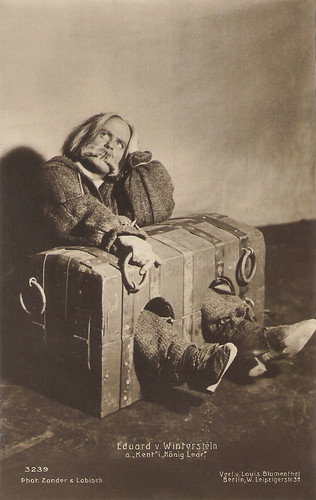
German postcard by Verlag Louis Blumenthal, Berlin, no. 3439. Photo: Zander & Labisch. Eduard von Winterstein as Kent in 'King Lear'.
Eduard von Winterstein (1871-1961) was a German film and theatre actor. His German film career spanned from the 1910s to the late 1950s, from the Wilhelminian cinema to the cinema of the GDR.

German postcard by Verlag Louis Blumenthal, Berlin-W., no. 5001. Photo: Becker & Maass.
Paul Otto (Schlesinger) (1878-1943) was a German film actor and director of the silent cinema. Otto appeared in 144 films between 1910 and 1940.

German postcard by Verlag Louis Blumenthal, Berlin W, no. 5008. Photo: Hettie Schüssler.
Erich Kaiser-Titz (1875-1928) was an actor in the German silent cinema of the 1910s and 1920s, playing in almost 300 films. Kaiser-Titz worked from 1906 at the Neue Theater, and subsequently, at the Deutsche Theater and from 1911 he became one of the most gifted actors in German early silent film.

German postcard by Verlag Louis Blumenthal, Berlin, no. 6003. Caption: 'Janz feudal!' Heinrich Peer als Leutnant von Grumow in the operetta 'Der fidele Bauer' (The Merry Farmer, 1907). This German-language operetta was composed by Leo Fall with a libretto by Viktor Léon. It premiered at the Mannheim Hoftheater on 27 July 1907 and was Fall's first major hit.
Austrian stage and film actor Heinrich Peer (1867–1927) belonged to the pioneers of German cinema and appeared in more than a hundred films between 1911 and 1927. The tall, thin actor with the distinctive, almost sinister face often played supporting parts in adventure and detective films but also played in melodramas and historical films.

German postcard by Louis Blumenthal, Berlin, no. 7381. Photo: E. Bieber, Hofphotograph, Berlin, and Hamburg.
Rudolph Schildkraut (1862-1930) was an Austrian film and theatre actor. From 1905 on, he was one of the most important actors in the ensemble of Max Reinhardt. Schildkraut played in some 28 German and Austrian films in the 1910s. In 1920 he moved to the USA.
Sources: Jean Ritsema (Ross Postcards), Emilio de Gogorza (Internet Archive), Deutsche Biographie (German) and Wikipedia.
No comments:
Post a Comment